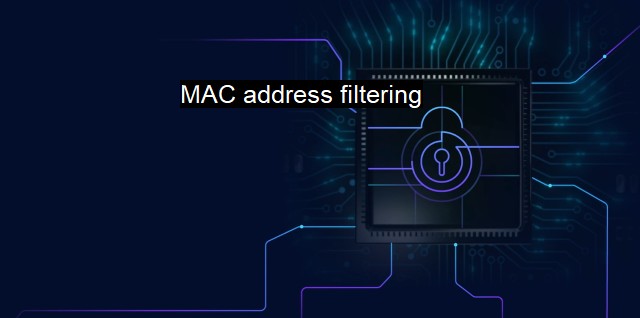What is MAC address filtering?
Enhancing Network Security with MAC Address Filtering: Techniques, Benefits, and Applications
MAC address filtering is a network-layer security technique that allows network administrators to limit network access to specific devices based on their unique identifier, known as the Media Access Control (MAC) address. This approach does an excellent job narrowing the range of possible attacks on networked resources, raising the security level of a given system.The MAC address, also known as the physical address, is a unique identification number written into the Network Interface Card (NIC) at the time of its manufacture. It consists of a six group of two hexadecimal digits. This address serves as a precise digital fingerprint for each device accessing the internet. Canvasses of network devices include PCs, smartphones, gaming consoles, routers, and modems, among many others. Therefore, the intention of MAC address filtering is to ensure only devices with uniquely defined MAC addresses can access or use a specific network.
MAC address filtering operates on network devices and uses a system of allowing - known as "whitelisting" - or denying - referred to as "blacklisting" - specific MAC addresses. Whitelisting is a process where only known and explicitly permitted addresses receive access authorization, while all others are automatically blocked. By contrast, blacklisting involves the management of a list of identified harmful or unfavorable MAC addresses excluded from network access, while all others remain accessible.
An enormous threat to network safety is unauthorized access. To minimize such vulnerabilities, a network security strategy such as MAC address filtering becomes increasingly significant. Using this safety system can prevent illegal access attempts and exploitation of local area network (LAN) resources. by selecting specific access points for certain users, network administrators can structure secure templates to guide network interactions.
While MAC address filtering does offer an appreciable level of security, it isn't entirely foolproof. Skilled cyber attackers can deploy MAC address spoofing - a practice that masquerades a malicious address below a legitimate one, thus bypassing the filtering process. It involves the masking of a device's MAC address by temporarily altering it. Due to the increasingly advanced nature of cyber threats, end-to-end security requires a combination of tactics, with MAC address filtering being just one ingredient in the recipe.
Despite this, MAC address filtering remains a critical component of network traffic control and resource exploitation prevention, primarily when employed alongside other robust cybersecurity mechanisms. Its use spans personal, corporate, and even national networking environments, signifying a prevalent security strategy. it can be used in collaboration with firewalls, Virtual Private Networks (VPN), and intrusion detection systems to provide multi-layered security that even some sophisticated cyber threats cannot easily bypass.
When talking about antivirus, MAC address filtering aids in virus control strategy by preventing unauthorized network access. Viruses and malware often infect devices by hopping from one connected device to another across networks. By enforcing a MAC filtering system, certain devices can be isolated or barred to hinder the spread of such infected files, effectively controlling potential damage.
MAC address filtering, despite its limitations, represents a cogent, frontline defense against potential cyber threats. It serves as a gatekeeper, deciding which devices get access to a network, contributing significantly to mitigating unauthorized access and data breaches. Its use, surpassing antivirus software protection, is a crucial part of multi-layered cybersecurity, safeguarding network resources from relentless adversaries. its application must concur with other security measures to proactively respond to the continually shifting cybersecurity landscape.

MAC address filtering FAQs
What is MAC address filtering?
MAC address filtering is a security feature that allows or blocks network devices from accessing your network based on their unique MAC address.How does MAC address filtering enhance cybersecurity?
MAC address filtering enhances cybersecurity by preventing unauthorized devices from accessing your network, reducing the risk of malicious attacks or intrusions.Can MAC address filtering replace antivirus software?
No, MAC address filtering and antivirus software serve different purposes. MAC address filtering controls which devices can access your network, while antivirus software detects and removes malicious software that may infect your devices.Is MAC address filtering 100% effective in preventing unauthorized access?
No, although MAC address filtering adds a layer of security, it is not foolproof. It is still possible for an attacker to spoof a MAC address and gain access to your network. Therefore, it should be used in conjunction with other security measures such as strong passwords, encryption, and regular software updates.| | A | | | B | | | C | | | D | | | E | | | F | | | G | | | H | | | I | | | J | | | K | | | L | | | M | |
| | N | | | O | | | P | | | Q | | | R | | | S | | | T | | | U | | | V | | | W | | | X | | | Y | | | Z | |
| | 1 | | | 2 | | | 3 | | | 4 | | | 7 | | | 8 | | |||||||